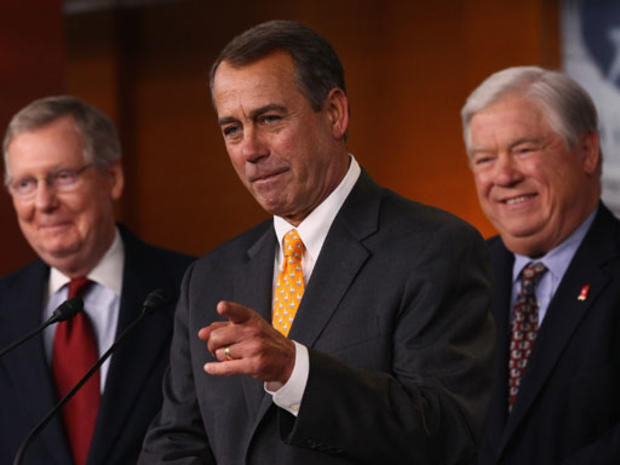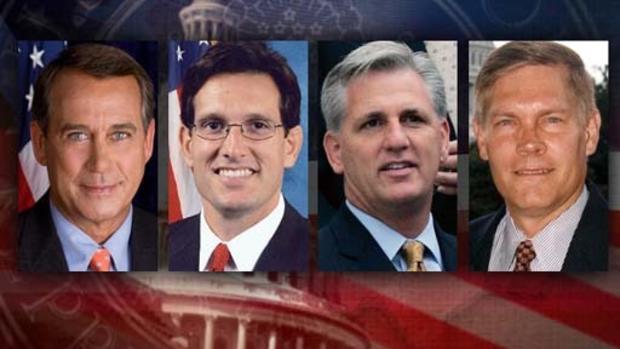112th Congress Begins: Gridlock on Horizon?
The 112th Congress of the United States begins today, and with it a new Republican majority takes charge of the House of Representatives. No longer will the Democrats control the White House, the House and the Senate. There will be, as so many tea party voices called for over the past year, checks and balances in Washington.
But checks and balances can also mean gridlock. Thomas Mann of the Brookings Institution wrote recently that the chances of Republicans and President Obama working together are slim.
"In spite of potential agreement on issues such as education, renewable energy, private sector innovation, and tax reform, prospects for bipartisan cooperation during the 112th Congress
Don't expect to see the gloves come off today or even this week. Today will be about electing John Boehner (R-OH) to serve as the next Speaker of the House.
Boehner will attend a prayer service in the morning at a Catholic church just blocks from the Capitol. The House will then convene at noon where it will shortly move to the election for Speaker which is expected to pit Boehner against incoming-Minority Leader Nancy Pelosi. Each member must vote by voice for their selection.
When Boehner wins, Pelosi will make a speech and hand over the Speaker's gavel she controlled for four years to Boehner. Boehner will then address the chamber.
After Boehner's speech, the longest serving member of the House, Rep. John Dingell (D-MI) will swear Boehner in and then Speaker Boehner will swear in the full House.
The House will then consider the rules package for the 112th Congress while Speaker Boehner holds mock swearing-in ceremonies for any member who wants a photo with the speaker and their families.
That's 434 potential photo-ops for Boehner.
The week will also be full of pomp and circumstance on Thursday when House Republicans, playing to the tea party and the new fervor for the government's founding principles, plan to read the entire constitution aloud on the House floor.
That will be followed by a vote to cut congressional budgets by five percent. A move that Republicans say will save over $35 million that's meant to show that Republicans are serious about cutting spending and are starting with their own offices.
It's a largely symbolic move since it is unlikely Majority Leader Harry Reid would even bring the repeal up in the Senate and the president could always veto the measure.
But Republicans vow to continue their effort to repeal and replace it piece by piece if necessary - a promise that can gum up the works in Washington by holding up must-pass spending bills that without passage can shut down the government.
In addition to health care, Republicans must also work to fulfill another campaign promise to reduce spending by $100 billion this year. Republicans leaders have been short on specifics, but incoming Majority Leader Eric Cantor said yesterday that "everybody is going to have to do more with less."
Those cuts could impact areas like education, transportation and law enforcement. Some Republicans even say that the Department of Defense should even be subject to the scalpel.
Those efforts could also be frustrated though by the fact that while everyone agrees the federal government needs to go on a diet, House Republicans and Senate Democrats will likely have very different ideas of which programs or benefits should be cut. Republicans like Cantor are pushing for President Obama to come up with some of his own proposals as well in time for the State of the Union address expected later this month.
Soon after the State of the Union address in February, House Republicans will also unveil their budget. A document expected to shine light on where Republicans plan to trim some of the excess spending and what direction they'd like to see the country move in the coming years. The difficulty for Republicans, and for the President who will have his own budget, is how to enact that vision when the opposing side's view is so different.
Both agendas will lay out the contrasts for voters in 2012 between the two parties and also is what having those checks and balances in Washington look like. It may lead to gridlock for the next two years, but it also gives voters a clear choice.
GOP Vows to Get the Economy Moving
As New House Convenes, Parties Swap Office Space - and Arguments
Congress Starts Fighting before GOP Takes Power

